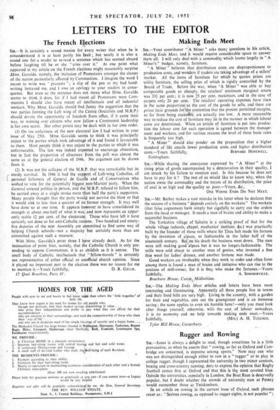LETTERS TO THE EDITOR
The French Elections
SIR,—It is certainly a sound maxim for every writer that when he is misunderstood it is at least partly his fault ; but surely it is also a sound one for a reader to re-read a sentence which has seemed absurd before laughing till he or she " cries over it." At one point what appeared in my article on the French elections might reasonably surprise lime. Gavalda, namely, the inclusion of Protestants amongst the classes of the nation particularly affected by Communism. I imagine the word I meant to write was " peasants " ; a slip of the pen or my bad hand- writing betrayed me, and I owe an apology to your readers in conse- quence. But even so the sentence does not mean what Mme. Gavalda seems to think it does, for if I had meant all Protestants were Com- munists I should also have meant all intellectuals and all industrial workers. Why Mme. Gavalda should find.funny the suggestion that the two parties forming the Left wing of the Centre (Socialists and M.R.P.) should devote the opportunity of freedom from office, if it came their way, to winning over citizens who now follow a Communist leadership is her own secret. Her other points may be dealt with in her own order.
(1) On trre unfairness of the new electoral law I had written in your issue of May 25th. Mme. Gavalda seems to think it was principally unjust to the parties which took advantage of it and found it favourable to them. Most people think it was unjust to the parties to which it was unfavourable. The law was indeed expected to encourage abstention, but in fact the proportion of absentees from the poll was almost the same as at the' general election of 1946. No argument can he drawn from it.
(2) It was not the collapse of the M.R.P. that was remarkable but its .sturdy survival. In 1946 it had the support of Left-wing 'Catholics, of L personal followers of General de Gaulle and of Conservatives who wished to vote for the potentially biggest non-Marxist party. When the General entered politics in person, and the M.R.P. refused to follow him, he carried away at a single stroke more than half the party's supporters. Many people thought that the party would not survive the blow or that it would sink to less than a quarter of its former strength. It may well have done so at one time. It appears however to have consolidated its strength at about one-half of what it was, and now represents an appar- ently stable 12 per cent. of the electorate; Those-who have left it have certainly not done so for anti-Catholic reasons. Two hundred and ninety- five deputies of the new Assembly are committed to find some way of helping Church schools—not a majority but certainly more than are ciimmitted against such a measure.
With Mme. Gavalda's point three I have already dealt. As for the insinuation of point four, namely, that the Catholic Church is only pre- tending to oppose Communism, it is as childish as it is untrue. The small body of Catholic intellectuals that " fellow-travels " is certainly not representative of either official or unofficial church opinion. , Since it played no important part in the election there was no reason for me 15 Quai Bourbon, Paris IV.


































 Previous page
Previous page